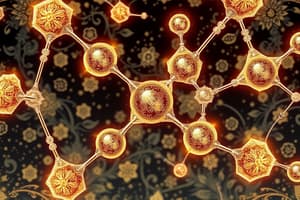Podcast
Questions and Answers
What is the primary focus of organic chemistry?
What is the primary focus of organic chemistry?
- The study of acids and bases
- The study of non-carbon-containing compounds
- The study of 3D arrangement of atoms in molecules
- The study of carbon-containing compounds and their properties (correct)
Which of the following reactions involves the replacement of one functional group with another?
Which of the following reactions involves the replacement of one functional group with another?
- Addition reaction
- Elimination reaction
- Substitution reaction (correct)
- Neutralization reaction
What is the primary focus of inorganic chemistry?
What is the primary focus of inorganic chemistry?
- The study of carbon-containing compounds and their properties
- The study of acids and bases
- The study of non-carbon-containing compounds and their properties (correct)
- The study of 3D arrangement of atoms in molecules
What is the term for the existence of multiple compounds with the same molecular formula but different structures?
What is the term for the existence of multiple compounds with the same molecular formula but different structures?
What type of reaction involves the transfer of electrons?
What type of reaction involves the transfer of electrons?
What is the study of the 3D arrangement of atoms in molecules?
What is the study of the 3D arrangement of atoms in molecules?
Flashcards are hidden until you start studying
Study Notes
Organic Chemistry
- Study of carbon-containing compounds and their properties
- Includes hydrocarbons and their derivatives (e.g. alkanes, alkenes, alkynes)
- Compounds can be found in living organisms or synthesized in a lab
- Key concepts:
- Functional groups: specific groups of atoms that determine a molecule's properties
- Isomerism: existence of multiple compounds with same molecular formula but different structures
- Stereochemistry: study of 3D arrangement of atoms in molecules
- Reactions:
- Substitution reactions: replacement of one functional group with another
- Elimination reactions: removal of a functional group to form a new compound
- Addition reactions: combination of two molecules to form a new compound
Inorganic Chemistry
- Study of non-carbon-containing compounds and their properties
- Includes salts, acids, bases, and other minerals
- Compounds are typically synthesized in a lab
- Key concepts:
- Acid-base chemistry: study of acids and bases and their interactions
- Coordination chemistry: study of complexes formed between central metal atoms and surrounding ligands
- Redox reactions: reactions involving oxidation or reduction of atoms
- Reactions:
- Precipitation reactions: formation of a solid precipitate from a solution
- Neutralization reactions: reaction between an acid and a base to form a salt and water
- Oxidation-reduction reactions: reactions involving transfer of electrons
Organic Chemistry
- Study of carbon-containing compounds and their properties
- Includes hydrocarbons and their derivatives (e.g. alkanes, alkenes, alkynes)
- Compounds can be found in living organisms or synthesized in a lab
Key Concepts
- Functional groups: specific groups of atoms that determine a molecule's properties
- Isomerism: existence of multiple compounds with same molecular formula but different structures
- Stereochemistry: study of 3D arrangement of atoms in molecules
Reactions
- Substitution reactions: replacement of one functional group with another
- Elimination reactions: removal of a functional group to form a new compound
- Addition reactions: combination of two molecules to form a new compound
Inorganic Chemistry
- Study of non-carbon-containing compounds and their properties
- Includes salts, acids, bases, and other minerals
- Compounds are typically synthesized in a lab
Key Concepts
- Acid-base chemistry: study of acids and bases and their interactions
- Coordination chemistry: study of complexes formed between central metal atoms and surrounding ligands
- Redox reactions: reactions involving oxidation or reduction of atoms
Reactions
- Precipitation reactions: formation of a solid precipitate from a solution
- Neutralization reactions: reaction between an acid and a base to form a salt and water
- Oxidation-reduction reactions: reactions involving transfer of electrons
Studying That Suits You
Use AI to generate personalized quizzes and flashcards to suit your learning preferences.




